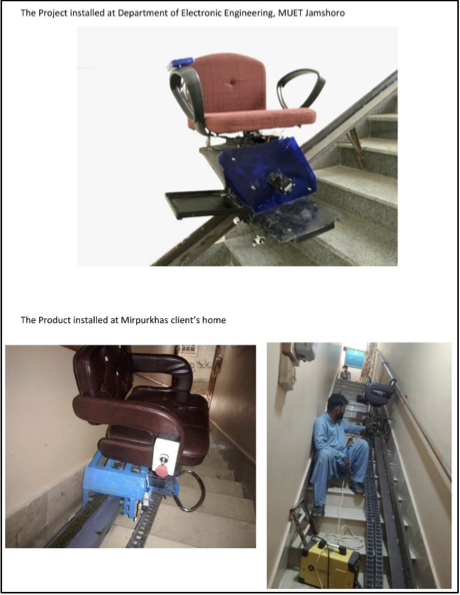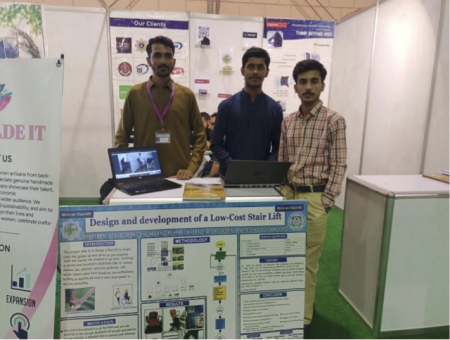- University
- Academics
- Admissions
- Departments
- Institutes
- Directorates
- Innovation & Entrepreneurship Center (IEC)
- Coal Research & Resource Center
- Office of Research, Innovation & Commercialization (ORIC)
- Centre of English Language & Linguistics
- Information & Communication Processing Center
- Management Information Systems
- Planning & Development
- Postgraduate Studies
- Quality Enhancement Cell
- Sports
- Directorate of Finance
- Research
- Sustainability
Equitable Access
MUET researchers from diverse disciplines are collaborating to develop innovative technological solutions that promote equitable access and inclusivity. MUET addresses critical challenges in areas such as assistive technology, education, and language processing.
Mehran Stairlift: Assistive Technology for Mobility
Dr. Attiya Baqai from the Electronics Engineering Department has spearheaded the groundbreaking "Mehran Stairlift" initiative. This project aims to install stairlifts for people with locomotive disorders, disabilities, and the elderly, providing them with improved mobility and independence. Recognizing the high costs and space constraints of traditional elevators and escalators, the Mehran Stairlift is designed to be cost-efficient and made from locally available materials in Pakistan.
With features like step counters, luggage carriers, digital displays, and Android control, this interdisciplinary project combines expertise in electronics engineering, mechanical design, and user experience to create an accessible and user-friendly solution. The Mehran Stairlift has garnered numerous accolades, including the National Idea Bank (NIB) City and Provincial Winner awards in 2021 and 2022, and funding from EPICS in IEEE for community service.



Links:
- Website: https://mehran-stairlift.netlify.app/
- LinkedIn: https://www.linkedin.com/company/mehranstairlift/
- Facebook: https://www.facebook.com/SGKstairlifts
Educational Robot for Autistic Children
In the field of robotics engineering, Professor Dr. Jawaid Daudpoto from the Mechatronics Engineering Department has been leading the development of an "Educational Robot for Autistic Children" since October 2017. This ongoing interdisciplinary project aims to create a specialized robot that can assist in the education and development of autistic children, providing tailored support to enhance their learning experience and social interactions.
By combining expertise in robotics, education, psychology, and human-computer interaction, the research team is working to create an innovative solution that caters to the unique needs of autistic children, promoting inclusivity and equitable access to educational resources.
Emotion Recognition in Low-Resource Languages
Dr. Zafi Sherhan Shah from the Telecommunication Engineering Department is leading an interdisciplinary project titled "Emotion Recognition of Low Resource (Sindhi) Language Using Machine Learning." This research focuses on developing algorithms and models to recognize emotions expressed in the Sindhi language, which is considered a low-resource language due to limited available data and resources for natural language processing tasks. By integrating expertise in computer science, linguistics, and machine learning, the project aims to analyze text or speech in Sindhi and infer the underlying emotions conveyed by the speakers or writers. This interdisciplinary approach has the potential to improve communication and understanding across diverse linguistic communities, promoting equitable access to language technologies and bridging cultural divides.
- Section:
